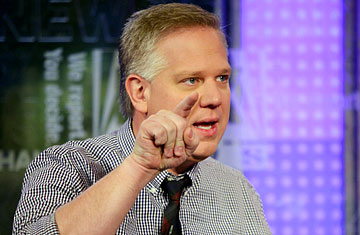
Radio and TV personality Glenn Beck says his book is a hybrid of fact and fiction, entertainment and education
Glenn Beck is a rookie novelist, but he had two enviable advantages when he jumped into the dying racket. The first was that The Overton Window, which hit stores June 15, would be a commercial blockbuster, like everything stamped with the Beck brand. The second was that it would have the liberals in the "lamestream media" hyperventilating over their soy lattes. "I know this book will be controversial; anything that causes people to think usually is," Beck writes in an author's note. The Fox News host calls the book, whose title is lifted from a theory about how to manipulate public opinion, a work of "faction": a hybrid of fact and fiction, entertainment and education. Whether readers consider it a prescient warning or an incoherent mess probably comes down to their view of its author, who will happily brush off critics' barbs on his way to the bank.
Beck's protagonist is Noah Gardner, a Manhattan yuppie with a corner office at his father's high-powered p.r. firm. Young, rich, smart and handsome — "[he] had all the bona fide credentials for a killer eHarmony profile" — Noah is also the beneficiary of nepotism. His father, Arthur Gardner, is a comically omnipotent spin doctor capable of conjuring up diseases for drug companies, killing newspaper exposés and selling the public on going to war. Cosseted by wealth and basking in his success with women, his son isn't really the revolutionary type. "You can't fix everything, and maybe you can't fix anything at all," Noah muses early in the book. "It's all too big, and too broken. So don't rock the boat, kid. Just count your blessings, keep your head down, and play the lucky hand that's been dealt to you."
Noah's world is upended, however, when he meets Molly Ross, a stunning mail-room clerk. "Something about this woman defied a traditional chick-at-a-glance inventory," Beck writes. "Without a doubt all the goodies were in the right places, but no mere scale of one to ten was going to do the job this time." Molly is also a member of the Founders' Keepers, an organization devoted to upholding the constitution and preserving the framers' vision. She opens Noah's eyes to a shadowy cabal concocting a plot to overthrow the U.S. government, and together they set out to foil it — a quest that includes run-ins with crooked police and invasive government agencies, as well as an attempt to bomb the office of an unnamed Senate majority leader from Nevada.
The book is equal parts apocalyptic showdown and dime-store romance novel, even if the love story — smug Upper East Side heir meets gorgeous wing nut — is a tad unconventional. He follows her to a Tea Party–type meetup at a downtown bar, gets dazzled by her encyclopedic knowledge of the Founding Fathers and sparks fly. It's clear Noah has chosen to join the righteous struggle when, in a sensuous moment during a visit to the Founders' Keepers' bohemian loft, he asks Molly to "hit me with a little Thomas Paine." We knew Beck was a master of agitprop, but it turns out he's also got a good ear for pillow talk.
What the author hasn't mastered is pacing. For a self-described thriller, The Overton Window is a plodding read. Beck may be a populist, but his appreciation for the finer things shines through in his loving descriptions of the trappings of wealth — from the plush hand towels in Noah's company limo to the appointments in his "$6 million co-op apartment" on Fifth Avenue. (Noah's neighbor, we learn, is a postscandal Eliot Spitzer, who makes a delightfully lecherous cameo.) Beck also gets bogged down by his characters' frequent soliloquies, in which they inveigh against bank bailouts, big government and liberal bugbears like Saul Alinsky. These jeremiads, which by now are familiar to anyone who has attended a Tea Party rally, will delight Beck's fans, but he doesn't have the writing chops to carry skeptics through the sermonizing.
For Beck's millions of acolytes, however, the one-dimensional characters and half-baked plot will be less important than his message, which will channel their anxieties about perceived assaults on our freedom. For literary-minded readers, meanwhile, it may not be the politics of The Overton Window but its prose that's unforgettable. Take Beck's description of our heroes' first kiss under the shimmering billboards of Times Square: "Molly looked into his eyes, and what he saw in her was a perfect reflection of a wanting that he also felt, so there was no delay of invitation and acceptance. It was a different sort of desire than he'd known before, an understanding that something now needed to be said that no language but the very oldest could possibly convey ... he felt her smile against his lips as they were brought back to where they stood by the brusque voice of a passing man, who advised in his native Brooklynese that maybe they should go and get a room." Now consider that this book will be an instant best seller. You may start to feel a little weepy.
